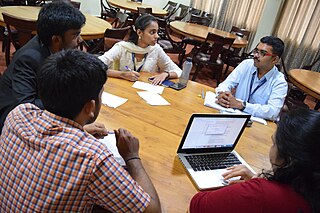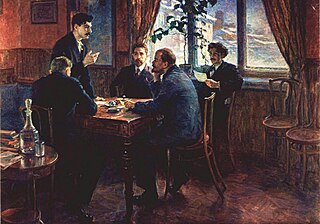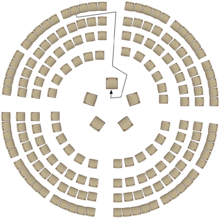
The Socratic method is a form of argumentative dialogue between individuals, based on asking and answering questions.

A focus group is a group interview involving a small number of demographically predefined participants. Their reactions to specific researcher/evaluator-posed questions are studied. Focus groups are used in market research to better understand people's reactions to products or services or participants' perceptions of shared experiences. The discussions can be guided or open. In market research, focus groups can explore a group's response to a new product or service. As a program evaluation tool, they can elicit lessons learned and recommendations for performance improvement. The idea is for the researcher to understand participants' reactions. If group members are representative of a larger population, those reactions may be expected to reflect the views of that larger population. Thus, focus groups constitute a research or evaluation method that researchers organize to collect qualitative data through interactive and directed discussions.
Bohm Dialogue is a freely flowing group conversation in which participants attempt to reach a common understanding, experiencing everyone's point of view fully, equally and nonjudgmentally. This can lead to new and deeper understanding. The purpose is to solve the communication crises that face society, and indeed the whole of human nature and consciousness. It utilizes a theoretical understanding of the way thoughts relate to universal reality. It is named after physicist David Bohm who originally proposed this form of dialogue.
A meeting is when two or more people come together to discuss one or more topics, often in a formal or business setting, but meetings also occur in a variety of other environments. Meetings can be used as form of group decision-making.

An Internet forum, or message board, is an online discussion site where people can hold conversations in the form of posted messages. They differ from chat rooms in that messages are often longer than one line of text, and are at least temporarily archived. Also, depending on the access level of a user or the forum set-up, a posted message might need to be approved by a moderator before it becomes publicly visible.

A conference is a meeting, often lasting a few days, which is organized on a particular subject, or to bring together people who have a common interest. Conferences can be used as a form of group decision-making, although discussion, not always decisions, is the primary purpose of conferences. The term derives from the word confer.

Brainstorming is a creativity technique in which a group of people interact to suggest ideas spontaneously in response to a prompt. Stress is typically placed on the volume and variety of ideas, including ideas that may seem outlandish or "off-the-wall". Ideas are noted down during the activity, but not assessed or critiqued until later. The absence of criticism and assessment is intended to avoid inhibiting participants in their idea production. The term was popularized by advertising executive Alex Faickney Osborn in the classic work Applied Imagination (1953).
A book discussion club is a group of people who meet to discuss books they have read. It is often simply called a book club, a term that may cause confusion with a book sales club. Other terms include reading group, book group, and book discussion group. Book discussion clubs may meet in private homes, libraries, bookstores, online forums, pubs, and cafés, or restaurants, sometimes over meals or drinks.

Christian Churches Together in the USA (CCT) is an organization formed in 2006 to "broaden and expand fellowship, unity and witness among the diverse expressions of Christian traditions in the USA" and represents over 98 million Christians in the United States.
Open space technology (OST) is a method for organizing and running a meeting or multi-day conference where participants are invited to focus on a specific, important task or purpose. The agenda and schedule of presentations are partly or mostly unknown until people begin arriving. The scheduling of speakers, topics, and locations is created by people attending once they arrive. A debriefing document is created at the end of each OST meeting, summarizing what worked and what did not. Harrison Owen created the method in the early 1980s as an alternative to pre-planned conferences, where conference organizers predetermined speakers and time was often scheduled months in advance. OST instead relies on decisions made by participants once they are physically present at the live event venue. OST was among the top ten organizational development tools cited between 2004 and 2013.

The Internet Governance Forum (IGF) is a multistakeholder governance group for policy dialogue on issues of Internet governance. It brings together all stakeholders in the Internet governance debate, whether they represent governments, the private sector or civil society, including the technical and academic community, on an equal basis and through an open and inclusive process. The establishment of the IGF was formally announced by the United Nations Secretary-General in July 2006. It was first convened in October–November 2006 and has held an annual meeting since then.

An unconference is a participant-driven meeting. The term "unconference" has been applied, or self-applied, to a wide range of gatherings that try to avoid hierarchical aspects of a conventional conference, such as sponsored presentations and top-down organization.
The National Issues Forums (NIF) is a US-based non partisan, nationwide network of civic, educational, and other organizations and individuals whose common interest is to promote public deliberation in America. NIF sponsors public forums and training institutions for public deliberation." Everyday citizens get to deliberate on various issues through NIF forums. Some of the issues discussed include civil rights, education, energy, government, etc. "Think, Deliberate, Act" is the slogan on the NIF.
Theatre for development (TfD) is a type of community-based or interactive theatre practice that aims to promote civic dialogue and engagement.

Planning poker, also called Scrum poker, is a consensus-based, gamified technique for estimating, mostly used for timeboxing in Agile principles. In planning poker, members of the group make estimates by playing numbered cards face-down to the table, instead of speaking them aloud. The cards are revealed, and the estimates are then discussed. By hiding the figures in this way, the group can avoid the cognitive bias of anchoring, where the first number spoken aloud sets a precedent for subsequent estimates.
An online interview is an online research method conducted using computer-mediated communication (CMC), such as instant messaging, email, or video. Online interviews require different ethical considerations, sampling and rapport than practices found in traditional face-to-face (F2F) interviews. Online interviews are separated into synchronous online interviews, for example via online chat which happen in 'real time' online and asynchronous online interviews, for example via email conducted in non-real time. Some authors discuss online interviews in relation to online focus groups whereas others look at online interviews as separate research methods. This article will only discuss online interviews.

Quiet: The Power of Introverts in a World That Can't Stop Talking is a 2012 nonfiction book written by American author and speaker Susan Cain. Cain argues that modern Western culture misunderstands and undervalues the traits and capabilities of introverted people, leading to "a colossal waste of talent, energy, and happiness."

A world café is a structured conversational process for knowledge sharing in which groups of people discuss a topic at several small tables like those in a café. Some degree of formality may be retained to make sure that everyone gets a chance to speak. Although pre-defined questions have been agreed upon at the beginning, outcomes or solutions are not decided in advance. The assumption is that collective discussion can shift people's conceptions and encourage collective action. Events need to have at least twelve participants, but there is no upper limit. For example, in Israel in 2011 an event called 1000 Tables was hosted in several cities on a single day as part of a series of social justice protests held around that time, and around a thousand people participated.
r/science is an Internet forum on Reddit where the community of participants discuss science topics. A popular feature of the forum is "Ask Me Anything" (AMA) public discussions. As of 2014, r/science attracted 30,000–100,000 visitors per day, making it the largest community-managed science forum and an attractive place to host discussions. It has almost 30.4 million members as of 2023.
Intercultural dialogue (ICD) builds upon the concept of dialogue, which refers to at least two people holding a conversation. And it builds upon the term intercultural, which is typically used to refer to people communicating across differences in nationality, race and ethnicity, or religion. Dialogue has several meanings: it sometimes refers to dialogue in a script, which simply means people talking, but more often it refers to "a quality of communication characterized by the participants' willingness and ability simultaneously to be radically open to the other(s) and to articulate their own views. ... Dialogue's primary goal is understanding rather than agreement."











